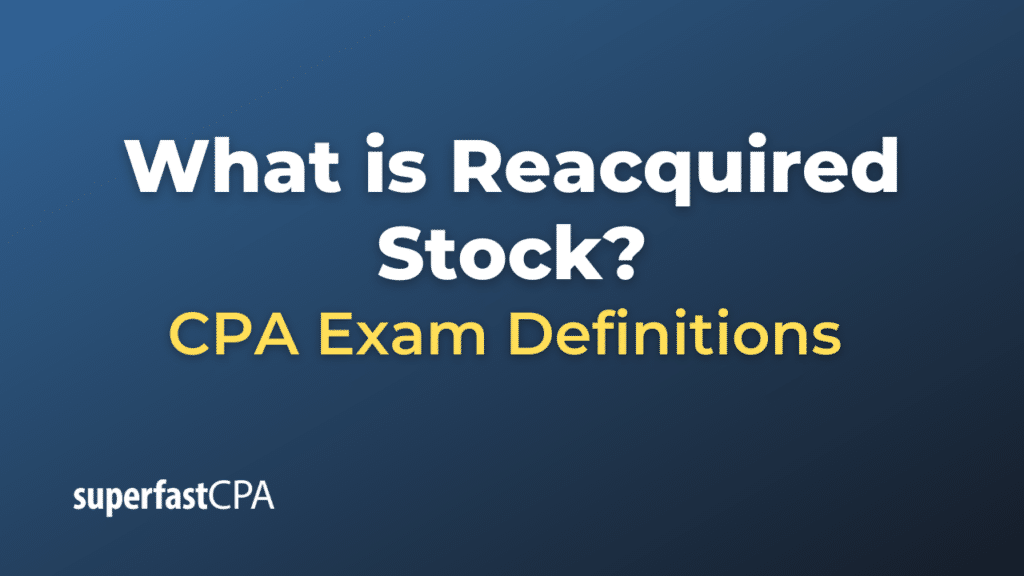Reacquired Stock
Reacquired stock refers to shares that a company buys back from its shareholders. When a company repurchases its own shares, it reduces the number of outstanding shares in the market. This practice is often referred to as a “stock buyback” or a “share repurchase.”
There can be several reasons why a company might choose to repurchase its own shares:
- Earnings Management: Buying back shares can increase earnings per share (EPS) since the earnings are now divided among fewer shares.
- Excess Cash Utilization: If a company has accumulated cash and doesn’t have profitable investment opportunities or other immediate uses for that cash, it might use the excess cash to repurchase shares.
- Capital Structure Adjustment: A company might repurchase shares to alter its debt-to-equity ratio.
- Positive Signal to the Market: Share repurchases can send a signal to the market that the company believes its shares are undervalued.
- Employee Compensation Plans: Companies often buy back shares to issue them to employees as part of stock compensation plans.
- Mitigate Dilution: To offset the dilution caused by stock options and other stock-based compensation.
- Defend Against Takeovers: Reducing the number of shares available can be a tactic to defend against hostile takeovers.
Once shares are reacquired, a company can either:
- Retire the Shares: This means the shares are permanently removed from circulation and cannot be reissued. They are no longer counted as outstanding shares, leading to an increase in EPS.
- Hold the Shares as Treasury Stock: These shares can be reissued at a later time, such as for raising capital, acquisitions, or for employee stock option plans.
It’s important to note that while reacquired stock can offer benefits, it also comes with potential downsides. Share repurchases can be seen as a lack of investment opportunities in the business, and over-reliance on buybacks might lead to underinvestment in areas critical for future growth.
Example of Reacquired Stock
Let’s use a hypothetical example of a company called “TechGlow Inc.”
Scenario:
TechGlow Inc. is a tech company that has been performing well over the past few years. Due to its strong performance, it has accumulated a cash reserve of $500 million. After considering potential acquisitions, research and development investments, and other capital expenditures, the company’s board decides that the best use of $200 million from these reserves is to repurchase its own shares.
Actions Taken:
- TechGlow announces to the public its intention to buy back shares worth $200 million over the next year.
- Over the course of the year, TechGlow buys its shares from the open market using the allocated $200 million.
Effects and Potential Reasons:
- Earnings Per Share (EPS) Boost: Before the buyback, assume TechGlow had an EPS of $5 and 50 million shares outstanding. If TechGlow earned the same amount next year but decreased its shares outstanding to 45 million due to the buyback, the EPS would rise to about $5.56, all else being equal.
- Signal to Investors: The buyback might signal to the market that TechGlow’s management believes its stock is undervalued. This can boost investor confidence and potentially increase the stock’s price.
- Utilizing Excess Cash: With the buyback, TechGlow has effectively returned value to its shareholders by using its excess cash.
- Employee Compensation Plans: TechGlow might decide not to retire all of the repurchased shares and keep some as treasury stock. This treasury stock could later be used to grant shares to employees under compensation plans.
Concluding the Scenario:
In this example, TechGlow utilized its strong cash position to repurchase and reduce its outstanding shares. Shareholders of TechGlow might benefit from a potentially increased stock price and a higher EPS. However, it’s crucial to note that while the buyback could lead to positive outcomes in the short term, the company’s long-term performance would still depend on its fundamental business operations and strategic decisions.













